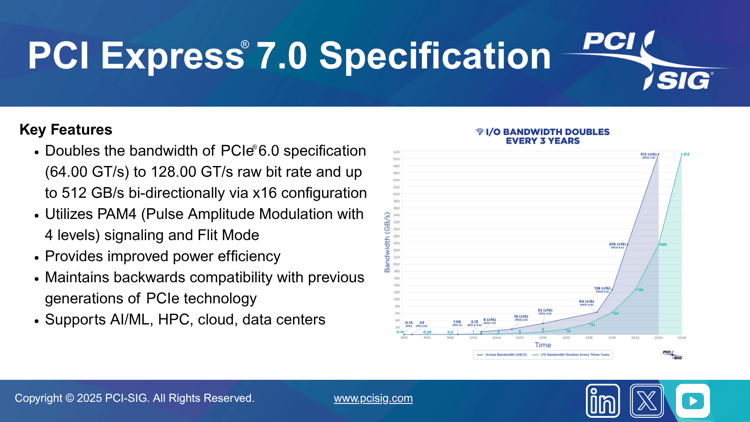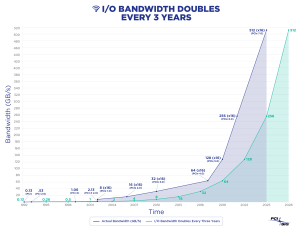PCI-SIG Releases PCIe 7.0 Specification to Support Bandwidth Demands of AI at 128.0GT/s Transfer Rates
Up to 512GB/s bi-directionally via x16 configuration, utilizes PAM4 (Pulse Amplitude Modulation with 4 levels) signaling and Flit-based encoding
This is a Press Release edited by StorageNewsletter.com on June 16, 2025 at 2:00 pmPCI-SIG announced the official release of the PCI Express (PCIe) 7.0 specification, reaching 128.0GT/s, to members.
PCIe 7.0 specification targets data-driven applications like AI/ML, 800G Ethernet, cloud, and Quantum computing. Pathfinding for the PCIe 8.0 specification is already in progress to continue supporting the industry’s investments and product roadmaps in the PCIe technology ecosystem.
PCIe 7.0 Specification Features
- Delivers 128.0GT/s raw bit rate and up to 512GB/s bi-directionally via x16 configuration
- Utilizes PAM4 (Pulse Amplitude Modulation with 4 levels) signaling and Flit-based encoding
- Provides improved power efficiency
- Maintains backwards compatibility with previous-gen of PCIe technology
Click to enlarge
“PCIe technology has served as the high-bandwidth, low-latency IO interconnect of choice for over two decades and we are pleased to announce the release of the PCIe 7.0 specification, which continues our long-standing tradition of doubling the IO bandwidth every three years,” said Al Yanes, president and chairperson, PCI-SIG. “As AI applications continue to scale rapidly, the next generation of PCIe technology meets the bandwidth demands of data-intensive markets deploying AI, including hyperscale data centers, HPC, automotive and military/aerospace.”
“It’s a special occasion when a PCIe specification hits the final version,” observed Ian Cutress, chief analyst and CEO, More Than Moore. “The rise in the demand for both compute and networking, enabled through PCIe technology, is at an all-time high, despite the complexities of creating standards in the industry around high-speed signaling. Datacenters are ready to start deploying networks built on PCIe 7.0 technology, and almost every ASIC company I talk to is already engaged with the IP providers and are set to take advantage. Even with the popularity and focus that went into PCIe 6.0 deployment, the PCIe 7.0 specification has more enthusiasm than any previous version.”
Resources:
PCIe 7.0 FAQ
PCIe 7.0 specification resource webpage (available for members)
PCI-SIG members can download the full specification
Blog: PCIe 7.0 Specification, Version 0.9: Final Draft Now Available for Member Review















 Subscribe to our free daily newsletter
Subscribe to our free daily newsletter

